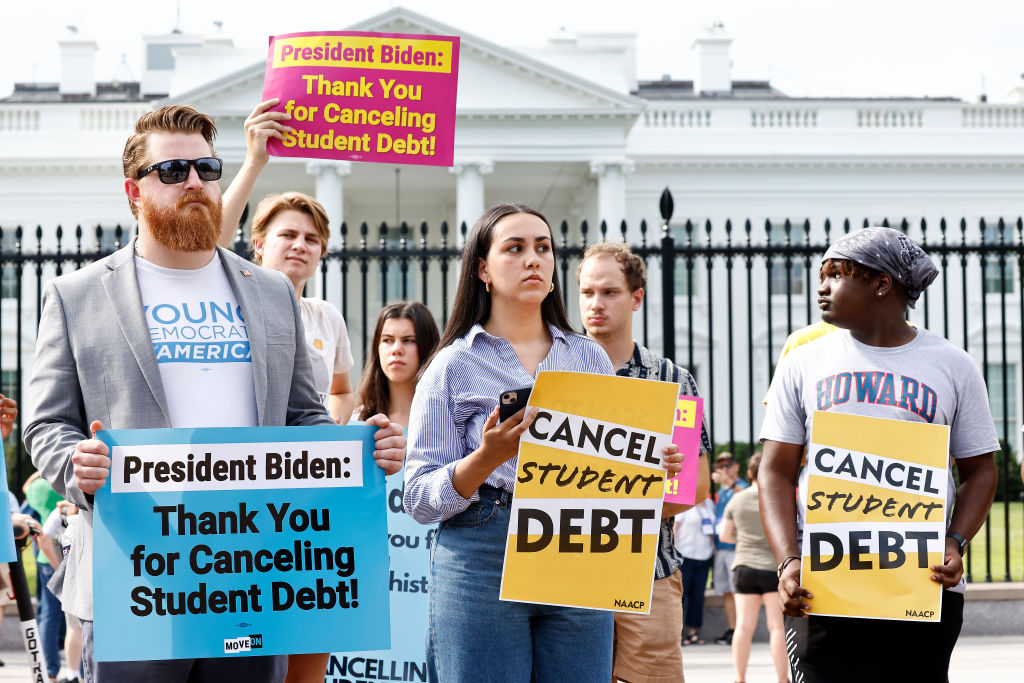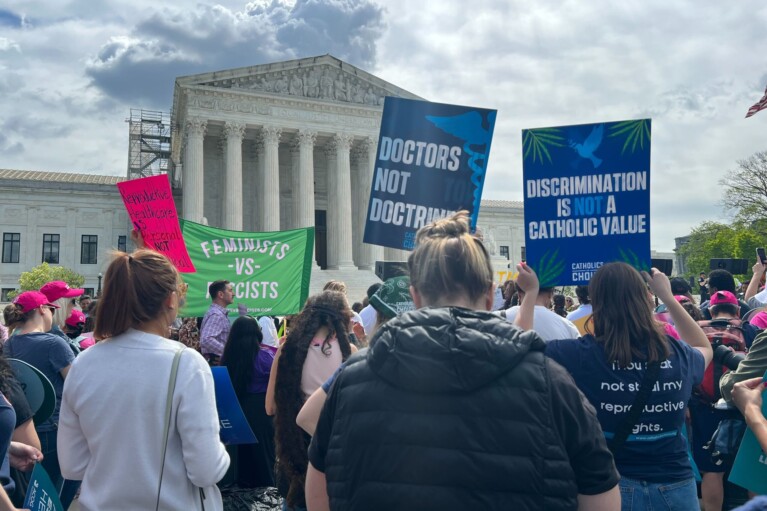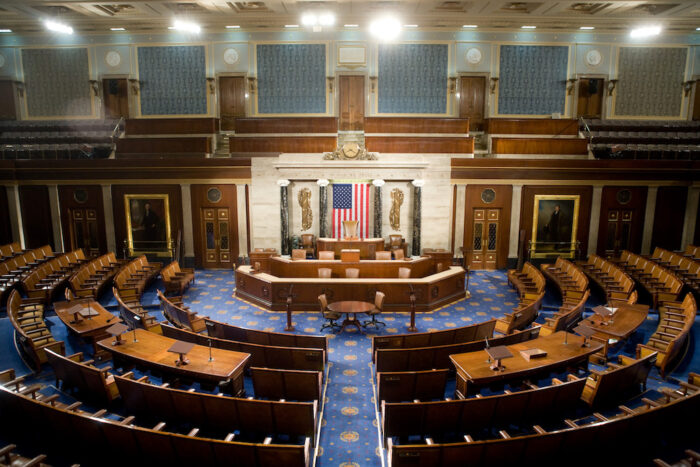U.S. Supreme Court rules against Biden administration student loan debt relief plan

The U.S. Supreme Court on Friday ruled that the Biden administration does not have the legal authority to enact a one-time student debt relief program, dealing a blow to the 40 million Americans who would have qualified.
Approximately 837,100 Marylanders have outstanding student loans, according to the Education Data Initiative — including 142,000 under the age of 25.
Last year, the Biden administration rolled out a debt forgiveness plan for borrowers with federal student loans that would be a one-time cancellation of up to $10,000.
Those student loan borrowers who had received Pell Grants — federal aid to help low-income students pay for higher education — could qualify for an additional $10,000 in forgiveness, a policy that was meant to provide equitable relief to Black borrowers.
In a 6-3 decision, Chief Justice John Roberts, writing for the conservative majority of the court, deemed that a loan servicer in Missouri, the Higher Education Loan Authority, known as MOHELA, would have its revenue threatened by the debt relief.
The case was filed by Republican attorneys general of Nebraska, Missouri, Arkansas, Kansas and South Carolina, along with Iowa Republican Gov. Kim Reynolds’ general counsel, and they argued the Biden administration overstepped its reach and that MOHELA would be harmed by a loss of profits from federal student loan debt relief.
The court majority agreed. “(T)he Secretary’s plan would cost MOHELA, a nonprofit government corporation created by Missouri to participate in the student loan market, an estimated $44 million a year in fees,” Roberts wrote.
“MOHELA is, by law and function, an instrumentality of Missouri: Labeled an ‘instrumentality’ by the State, it was created by the State, is supervised by the State, and serves a public function. The harm to MOHELA in the performance of its public function is necessarily a direct injury to Missouri itself.”
President Biden said in a statement that “the fight is not over” to help borrowers.
“I believe that the Court’s decision to strike down our student debt relief plan is wrong,” Biden said, adding that his administration plans to announce more efforts to help borrowers.
“I will stop at nothing to find other ways to deliver relief to hard-working middle-class families,” he said. “My Administration will continue to work to bring the promise of higher education to every American.”
Later Friday, Biden at a press conference said the Department of Education will begin the negotiated rulemaking process to “compromise, waive or release loans under certain circumstances” under the Higher Education Act. The HEA has a provision to allow the secretary of education to “waive or modify” federal student loans. The first public hearing is on July 18.
Biden also announced that the Department of Education has finalized its new income repayment-driven program known as the “Saving on a Valuable Education,” or SAVE. Biden said it will save borrowers more than a $1,000 a year.
The new income repayment plan would cap payments for undergraduate loans to 5% of an indivdiual’s income rather than 10%, and borrowers with loans from undergraduate and graduate school would pay between 5% and 10% of what they originally borrowed in undergrad.
Biden added that the Department of Education will create a temporary 12-month “on-ramp” repayment program for borrowers. Student loan repayments are set to begin Oct. 1.
“We know that figuring out how to pay these expenses can take time for borrowers, and they might miss payments at the front end as they get back into repayment,” Biden said.
But the top Republican on the Senate Health, Education, Labor and Pensions Committee, Sen. Bill Cassidy of Louisiana, and the chair of the House Education and the Workforce Committee, Virginia Foxx of North Carolina, released a joint statement condemning the Biden administration for this latest proposal.
Cassidy pointed out that the 12-month “on ramp” violates the agreement that Biden made with House Speaker Kevin McCarthy to end the pause on student loan repayments.
Earlier in the day, Maryland Attorney General Anthony Brown (D) said the court’s ruling would especially harm current and former students of color.
“Once again, the Supreme Court today rolled back protections and support for people who disproportionately face discrimination and other obstacles as they seek to pursue educational opportunities,” he said in a statement. “And in doing so, the Court deprives us all of the benefits of a fully diverse and inclusive society that taps the potential of every individual. Piling on its decision yesterday to undermine Black and Brown students’ access to higher education, the Court today has also made it more difficult for members of these same communities to get out from under the crushing burden of student loan debt that they shoulder in disproportionate numbers.”
As a state, Maryland has the highest average balance for student loans in the country, $39,505, according to Lending Tree.
Republicans celebrated the decision. Missouri Attorney General Andrew Bailey (R) said at a news conference that the case was about “protecting working Missouri families from getting saddled with Ivy League debt,” and about “basic fairness.”
“I paid for my college with blood, sweat and tears, and service to my country, and it’s only fair that working families not be stuck with other people’s debt,” Bailey said.
All three liberal Justices, Sonia Sotomayor, Elena Kagan and Ketanji Brown Jackson, dissented. Kagan, writing for the dissenters, did not agree with the finding the states had standing.
“The plaintiffs here are six States: Arkansas, Iowa, Kansas, Missouri, Nebraska, and South Carolina,” Kagan wrote. “They oppose the Secretary’s loan cancellation plan on varied policy and legal grounds. But as everyone agrees, those objections are just general grievances; they do not show the particularized injury needed to bring suit.”
The justices unanimously decided that a second case challenging the debt relief plan did not have legal standing. That case was brought by a two people with student loan debt who would either partially or entirely not qualify for the White House program. The case was backed by the conservative advocacy group the Job Creators Network Foundation.
Turbulent history for student debt relief
The Biden administration’s student debt relief plan has not only been challenged in the courts by Republicans, but also in Congress. The House and the Senate voted to overturn the policy through the Congressional Review Act, but Biden vetoed the resolution.
More than 16 million borrowers had already been approved for relief, according to the Department of Education, before the agency was blocked from accepting more applicants following a nationwide injunction.
Repayments on federal student loans are set to resume Oct. 1, but interest accrual will begin starting Sept. 1, according to the Department of Education.
The Department of Education did not respond to a States Newsroom request for comment, but said on its website that the agency is “reviewing the Court’s decision to determine next steps.”
More than 43 million Americans have student loan debt, and the Federal Reserve estimates that the total U.S. student loan debt is more than $1.76 trillion.
A law passed in early June to address the nation’s debt ceiling codified that the White House would not be able to extend the pause on repayment for federal student loans unless approved by Congress.
For three years, there has been a pause on federal student loan repayment due to the coronavirus pandemic that was initially put in place by the Trump administration and extended by the Biden administration.
In a statement, Iowa’s Reynolds said the decision “affirms what Iowans have believed this entire time: the hard-working men and women of this country should not bear the burden of paying off others’ loans.”
“This plan belittles Iowans who paid their own debt or chose not to pursue a traditional four-year degree,” she said.
HEROES Act central to ruling
Roberts disagreed with the Biden administration’s argument that the federal HEROES Act allowed the secretary of education “to cancel $430 billion of student loan principal.” The HEROES Act, first enacted 20 years ago, was used by the Trump administration to suspend repayments on federal student loans at the onset of the pandemic.
During oral arguments in March, U.S. Solicitor General Elizabeth B. Prelogar — representing the Biden administration — argued that under the HEROES Act, the secretary of education can “waive or modify any statutory or regulatory provision” to help borrowers in a national emergency, such as the coronavirus pandemic.
Roberts said the administration went too far. “We hold today that the Act allows the Secretary to ‘waive or modify’ existing statutory or regulatory provisions applicable to financial assistance programs under the Education Act, not to rewrite that statute from the ground up,” Roberts wrote.
Roberts invoked the “major questions doctrine,” which means that if Congress wants to give an agency, such as the Department of Education, the power to make a decision of “economic and political significance,” it has to explicitly say so.
Roberts wrote that “the question here is not whether something should be done; it is who has the authority to do it.”
Congress is unlikely to act on debt relief anytime soon, with control split between a Republican House and a Democratic Senate.
Youth vote
The decision is likely to become an issue in the race for the presidency. Youth organizations that back student debt relief said they will use the ruling to rally support.
Cristina Tzintzún Ramirez, president of NextGen America, one of the largest youth voting organizations, said in a statement that “young voters will remember this come 2024.”
She added that, “heading into 2024, we will not forget the people who fight for us everyday and the people who would rather protect the pockets of shady billionaires.”
Another Gen Z-led organization, Voters of Tomorrow, echoed similar sentiments.
“We hope that the Biden Administration is able to negotiate a deal through Congress or take executive action to relieve student debt for all Americans,” the group said in a statement. “While we know it will be difficult with far-right politicians who have championed the removal of the plan, it is what is needed to remove the burden from millions of Americans.”
Kendra Cotton, the CEO of New Georgia Project, a voter mobilization group, said in a statement that in “the wake of this decision, New Georgia Project will double down on our efforts to connect the issues Black, brown, and young Georgians need to secure their economic futures — an increased minimum wage, better access to healthcare, and more affordable housing — to the importance of voting.”
GOP presidential candidates, such as Nikki Haley, praised the decision as stopping executive overreach from the White House.
“A president cannot just wave his hand and eliminate loans for students he favors, while leaving out all those who worked hard to pay back their loans or made other career choices,” she said.
“The Supreme Court was right to throw out Joe Biden’s power grab.”
Another presidential candidate, Republican Sen. Tim Scott of South Carolina, released a video statement, arguing that there are other pathways to the “American Dream” that don’t require a college degree.
“We need more welders, carpenters and electricians,” he said. “These are the jobs that built America, and these are the jobs liberal elites can’t ship to China.”
Josh Kurtz contributed to this report.




 Creative Commons Attribution
Creative Commons Attribution